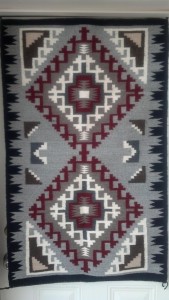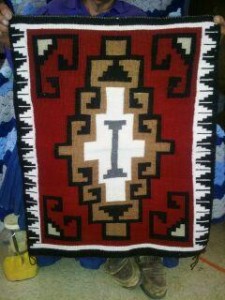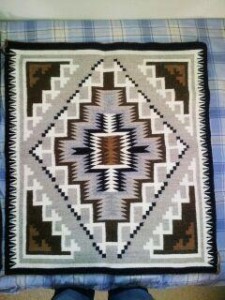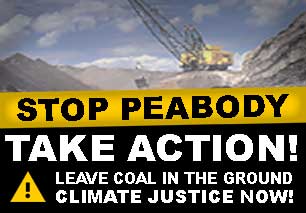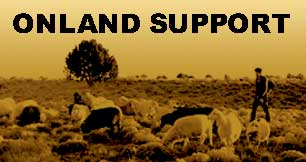New! Beautiful Hademade Rugs for Sale
These beautiful rugs are made by master weavers from Black Mesa. From herding the sheep, to dying the wool, to weaving the rugs, the weavers hand craft their rugs in the traditional Dineh (Navajo) method.
Please contact 928-309-9051 with any questions
Size: 29 1/2 x 48
Ganado red design
navajo handmade commercial wool
Tightly woven
Price: $900-1000

Size: 24 in. x 30 in.
Price: $400 and negotiable.
Eye Dazzler, all handmade with fine commercial wool and woven tight
SOLD!
Caravan November 2010 Transcripts/Notes—translation from Dine by Danny Blackgoat
Caravan November 2010 Transcripts/Notes—translation from Dineh by Danny Blackgoat
Katherine Smith
“This is a 40-year, ongoing struggle with the empire of the West that allows places to spread out because of the resources here like coal and water. How do people understand the amount they consume in the desert—the golf courses, the swimming pools—it’s an illusion. It’s like a fairy tale, but at the sacrifice of what?”
“People give up their land and their community. They can’t improve their homes and have no access to power or water.”
Marie Gladue
*Water Settlement: “It’s a whacked out settlement; our hearts are broken by our leaders. You’re not supposed to say this in Navajo, but it feels like they’re putting us in a coffin. We see the decision about water as a way to continue the termination of our people.”
“There’s great satisfaction in learning that you are not the only one who exists in the world, to learn, for example, what the plants are telling you. The five-fingered are not the only ones in this environment.”
“The people living high off the hog have to be made to think. Use messaging—band together and buy a billboard in Phoenix. Tell them what’s going on; tell your people.”
“We’re not given the value of coal—it’s pennies. Same with water—they get $1,000 per acre/foot and only a few dollars come back here.”
“Phoenix is living off of our generosity, getting 34 acres of water a year for free. I don’t understand that. You know your own people. You know how things work in your world. You can support by making your own people conscious of the specific relationship between their lives and ours. “
“No one in their right mind would build a city in the desert with golf courses and swimming pools. We think about that paradox out here.”
“We stay here for our people.”
“There is always this idea that there is justice and fairness in the courts. It isn’t true.”
“The whole issue [relocation] has been such a can of worms that people want to just keep it closed.”
Suggestions: Just Transition, Begin with shutting down the Mojave Generating Station, “revalue what knowledge was in terms of crops and livestock.”
Mary Lou Blackrock
“We don’t have leaders who can help us. We hear a lot about leaders but we don’t see them until election time with their slogans. I went to Window Rock and they told me to go to Hopi, that it was their jurisdiction. The younger generation can’t establish homesites here on the HPL, so we’re left alone. I met Ben Shelly before the elections, during his campaign. I told him where I live, at the border of the HPL. He didn’t know where I lived or my condition. I told him to come and visit me in a blizzard.”
“Heard about the Navajo and Hopi joining forces….we are subjects. We are suffering.”
Pauline Whitesinger
“We don’t intermingle like in the old days. We’ve lost contact. I have forgotten some of the ladies here. My vision is failing. I make assumptions of who people are based on their voices. “
“I heard about the new Navajo president meeting with the Hopi president. They are getting cozy and making an agreement to remove the rest of the Navajo from the HPL. I am anguished by this news. Can we go to Window Rock and put a document forth to them? They will take the proceeds from the mine together, I suspect.”
“I must be going crazy. Things are in disharmony.”
Mae Tso
“Under Hopi we can only have a certain amount of sheep. They enforce it and they are always looking over our shoulder. They may extend this [impoundments] to twice a year, Spring and Fall.”
“The Navajo and Hopi leadership have come together to push more people off of the HPL…the final solution [that was Danny’s interpretation].”
“The Hopi Rangers have drained the aquifers. We need to keep the water on the reservation.”
Evelyn Simonson
“They are confiscating animals because they have plans for the mine.”
“The people who finished their education off the land went on to manage the mine. I might have too if I had finished my school, but I remembered Grandma’s teachings about the land.”
“Greed for money is affecting the climate. It is affecting our lives here. We want to live in harmony with the natural elements, but things are changing. The snow is changing. This winter I saw snow that was blue. It wasn’t normal or natural.”
“As a young woman I was told to be a caretaker of the land and I try, but I see it disrupted right before my eyes.”
“I always wondered when the day would come when the wind would stop on the surface of the earth and take all of us at once.”
Louise Benally
Suggestions: Plug into National organizations, connect Black Mesa mining to the national impact of Fossil Fuel use, get a community office (on HPL—rent from the mission), increase self-care efforts (like herbal clinics, etc.), more networking, more self-sufficiency, more education, get a radio stationed (licensed, not pirate).
BMIS Points of Unity
These principles reflect what we believe to be truly important aspects of our work.
We’ve adapted the following from SmartMeme:
In all of our efforts to collaborate for change, we value relationships, and approach our work with respect for all people and all life on Earth. We strive in both our perspectives and practices, to challenge racism, sexism, homophobia, and oppression in all its forms.
We challenge power structures at all levels. We are committed to becoming better allies by helping to develop accountable leadership and build broad-based movements for environmental, social, and economic justice.
We intend this to be living document and an evolving guide for Black Mesa Indigenous Supports practices, strategy, and vision. We commit to embracing the following principles:
Holistic Analysis: Social, economic and ecological issues are interconnected and interdependent. We believe in “supporting Native communities to protect the Earth we all share” so eloquently stated by Honor The Earth. The problems are interrelated, and so are the solutions.
Analyzing Power: Through the analysis of institutional power, we identify and unpack the systems of oppression, and analyze the narratives that help to legitimize and hold these institutions in place. We bring power analysis as a lens to all of our work.
Undoing Racism: Racism is the single most critical barrier to building effective coalitions for social change. We commit to create and promote an anti-racist culture in our organization, and practice anti-racism in our personal and political work.
Listening: We take responsibility for making space for all voices in the Black Mesa community, the support group and larger network. We prioritize listening to the front-line communities of Black Mesa who are impacted by coal mining & forced relocation. We listen to the experiences, stories, and histories, as told by them. We also prioritize listening to elders, youth, women, queer folks, and people of color. We strive to listen to what people are saying or by what they’re not saying.
Appreciation and Gratitude: for the whole of each other’s personhood. We will respect and nurture each other’s culture, class, gender, orientation, racial, and religious differences. We will be sensitive to each other’s family situations. We will resist arrogance. We will be willing to share our weaknesses. We will call each other out, and also celebrate each other often.
Acting: consciously and consistently to challenge historic patterns of marginalization
and oppression including racism, sexism, homophobia and discrimination in all its forms.
We are committed to being a visible ally. We are committed to action and taking public positions on oppression. We will help build a multi-racial, anti-racist movement.
Leadership: To organize with integrity requires that we be accountable to the communities struggling with oppression, and develop accountable leadership and relationships.
Networking: The growth of an effective broad-based movement for social transformation requires networking or “building a net that works.” As the movement develops a strong net, people are less likely to fall through. Black Mesa Indigenous Support nurtures our network and acts as a connector across the issues and communities we serve.
We, the collective volunteers & greater network of BMIS commit ourselves to working together to embody the above-stated principles. If you share these principles, we invite you to join us in fulfilling them.
We also agree with Honor The Earth’s statement:
“We believe a sustainable world is predicated on transforming economic, social, and political relationships that have been based on systems of conquest toward systems based on just relationships with each other and with the natural world. ….we are committed to restoring a paradigm that recognizes our collective humanity and our joint dependence on the Earth”.
BMIS has adopted the following principles from Unsettling America, (which in turn was adapted from Unsettling MN)
- As settlers and non-native people (by which we mean non-indigenous to this hemisphere) acting in solidarity, it is our responsibility to proactively challenge and dismantle colonialist thought and behavior in the communities we identify ourselves to be part of. As people within communities that maintain and benefit from colonization, we are intimately positioned to do this work.
- We understand that allies cannot be self-defined; they must be claimed by the people they seek to ally with. We organize our solidarity efforts around direct communication, responsiveness, and accountability to indigenous people fighting for decolonization and liberation.
- We are committed to dismantling all systems of oppression, whether they are found in institutional power structures, interpersonal relationships, or within ourselves. Individually and as a collective, we work compassionately to support each other through these processes. Participation in struggle requires each of us to engage in both solidarity and our own liberation: to be accountable for all privileges carried, while also struggling for liberation from internalized and/or experienced oppression. We seek to build a healthy culture of resistance, accountability, and sustenance.
We have also adopted Setting The Record Straight’s Points of Unity:
- We recognize that “race” is a false construct, arbitrarily created by Europeans to establish and maintain privilege and power. “Whiteness” was invented for similar reasons and serves as “North” on the illegitimate “compass” of race by creating hierarchies of language, skin tone, religious practice, and culture. We seek to deconstruct these oppressive paradigms and take part in the effort already established to build and resurrect models of human interaction based on cooperation and the value inherent in our various traditions and cultures.
- We recognize and respect the inherent autonomy and self-determination of indigenous groups. We define autonomy as the capacity of communities to survive and thrive without interference or threat of violence from outside forces. We see self-determination as the power of a community to define its own fate and course of action.
- We seek an immediate end to all genocidal policies and activities. We oppose the full range of genocidal actions, including things like cultural appropriation, which are often mistakenly thought of as non-genocidal because they don’t necessarily entail direct physical violence.
- We seek to help create relationships of true and lasting justice between indigenous and non-indigenous communities. We believe that those who benefit from the occupation of indigenous territories have a responsibility to put effort into helping build these fundamentally just relationships. If necessary, non-indigenous communities should make themselves available to indigenous groups as a source of aid and support. Because everyone ultimately stands to gain from this process, we promote mutual empowerment, not charity.
- We support and respect a diversity of tactics and efforts made by colonized groups to resist oppression and/or reclaim complete autonomy. However, we may not condone all methods used, or choose to utilize certain methods ourselves.
- We will actively fight all oppression in ourselves, our collective and events, in liberatory movements, and outside the movement. We hold that all systems of oppression are linked, and that no movement for liberation can succeed while replicating/maintaining any oppression. We will not tolerate any form of oppression. Some systemic oppressions include racism, sexism, transphobia, and ablism.
And last but not least!:
- All Indigenous Peoples in the occupied lands known as the United States have the right to self-determination and access to clean and safe land-bases.
- Representation: BMIS and the regional network agree to not act as a representative of or speak on behalf of the struggle. We agree to only speak for ourselves.
EPA RULE CRIPPLES PUBLIC’S RIGHT TO KNOW IF WORST AIR POLLUTERS ARE VIOLATING THE LAW
Approach Prohibits States from Including Adequate Monitoring
Requirements in Air Pollution Permits
WASHINGTON, D.C.///February 12, 2007///Environmentalists are heading
to court today to challenge an Environmental Protection Agency rule
that weakens clean air requirements for major industrial polluters.
The recently finalized rule enables the nation’s largest polluters to
avoid monitoring, recordkeeping, and reporting requirements needed to
document whether they are illegally polluting the air. Read more
Biological Diversity Press Release
FOR IMMEDIATE RELEASE, February 6, 2007
CONTACT: Erik Ryberg, Center for Biological Diversity, (520) 260-4157
Hamlet Paoletti, Natural Resources Defense Council, (310) 434-2300
Wahleah Johns, Black Mesa Water Coalition, (928) 863-1375
Groups Challenge Environmental Analysis of Controversial Black Mesa Mine:
Feds Failed to Consider Harmful Impacts to Sacred Springs Read more
Tensions run high at final Black Mesa DEIS hearing
Rebecca Schubert
The Observer
FLAGSTAFF-Gathering from communities across northern Arizona and
beyond people of the many nations including the Hopi, Navajo and U.S.
came together to learn and discuss the Office of Surface Mining’s Draft
Environmental Impact Statement (DEIS). The public meeting was the
final in a series of 12 held by the U.S. Department of the Interior Office
of Surface Mining (OSM) administrators across northern Arizona. Read more
Big Coal’s Dirty Move
As the world heats up, the coal industry is racing to build more than 150 new power plants before Congress decides to crack down on global warming
JEFF GOODELL
According to the American Heritage Dictionary, a suicidal act is one that is “dangerous to oneself or to one’s interests; self-destructive or ruinous.” By this standard, the coal boom that is currently sweeping America is the atmospheric equivalent of a swan dive off a very tall building. At precisely the moment that scientists have reached a consensus that we need to drastically cut climate-warming pollution, the electric-power industry is racing to build more than 150 new coal plants across the United States. Coal is by far the dirtiest fossil fuel: If the new plants are built, they will dump hundreds of millions of tons of carbon dioxide into the atmosphere each year for decades to come — virtually guaranteeing that the U.S. will join China in leading civilization’s plunge into a superheated future. Read more
Black Mesa EIS meeting one for the record
Black Mesa EIS meeting one for the record
By Kathy Helms
Dine Bureau
Wednesday, January 3, 2007
WINDOW ROCK — To call Tuesday night’s meeting on Peabody Western
Coal Co.’s Black Mesa Project a public hearing, “is really
inadequate,” Navajo Nation Council Delegate Amos Johnson told
federal officials.
But that wasn’t the only complaint in an evening that didn’t get
off to a good start and broke up just short of descending into
verbal chaos. Read more
